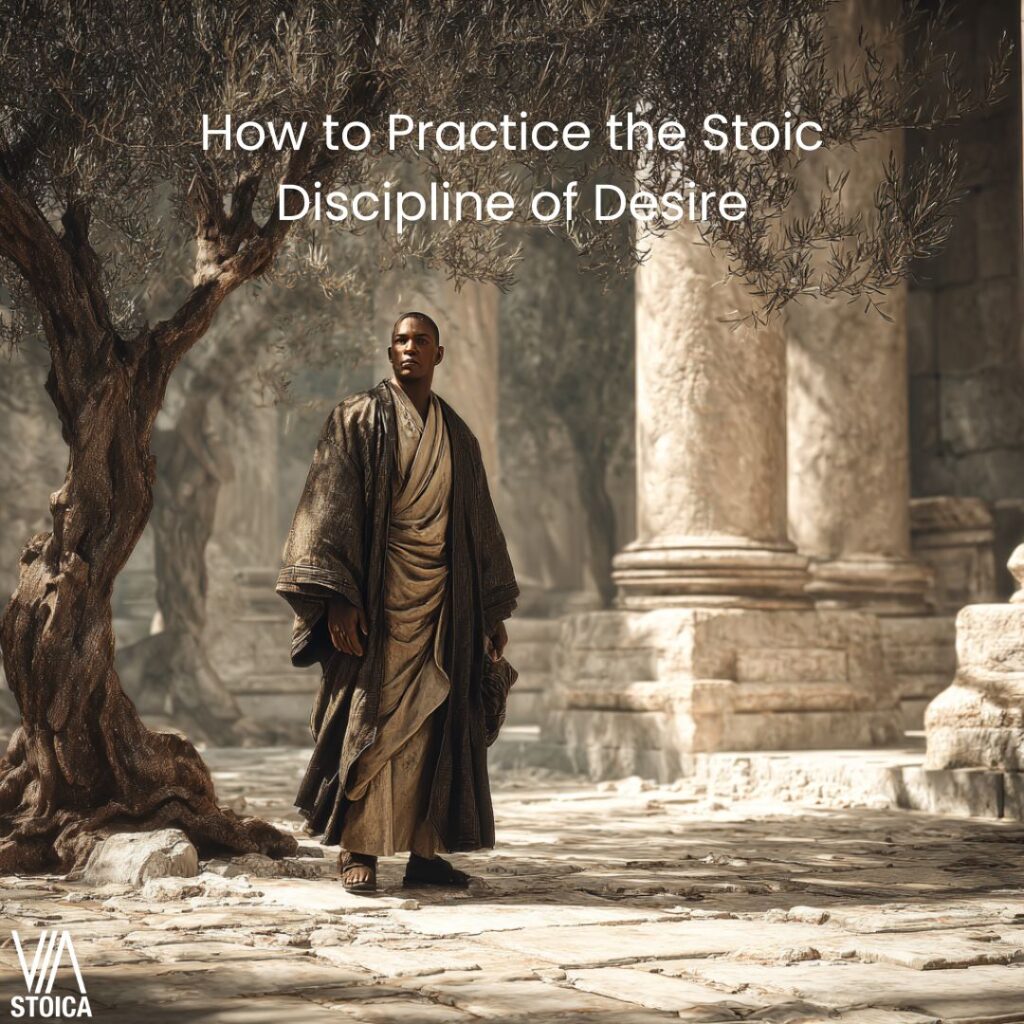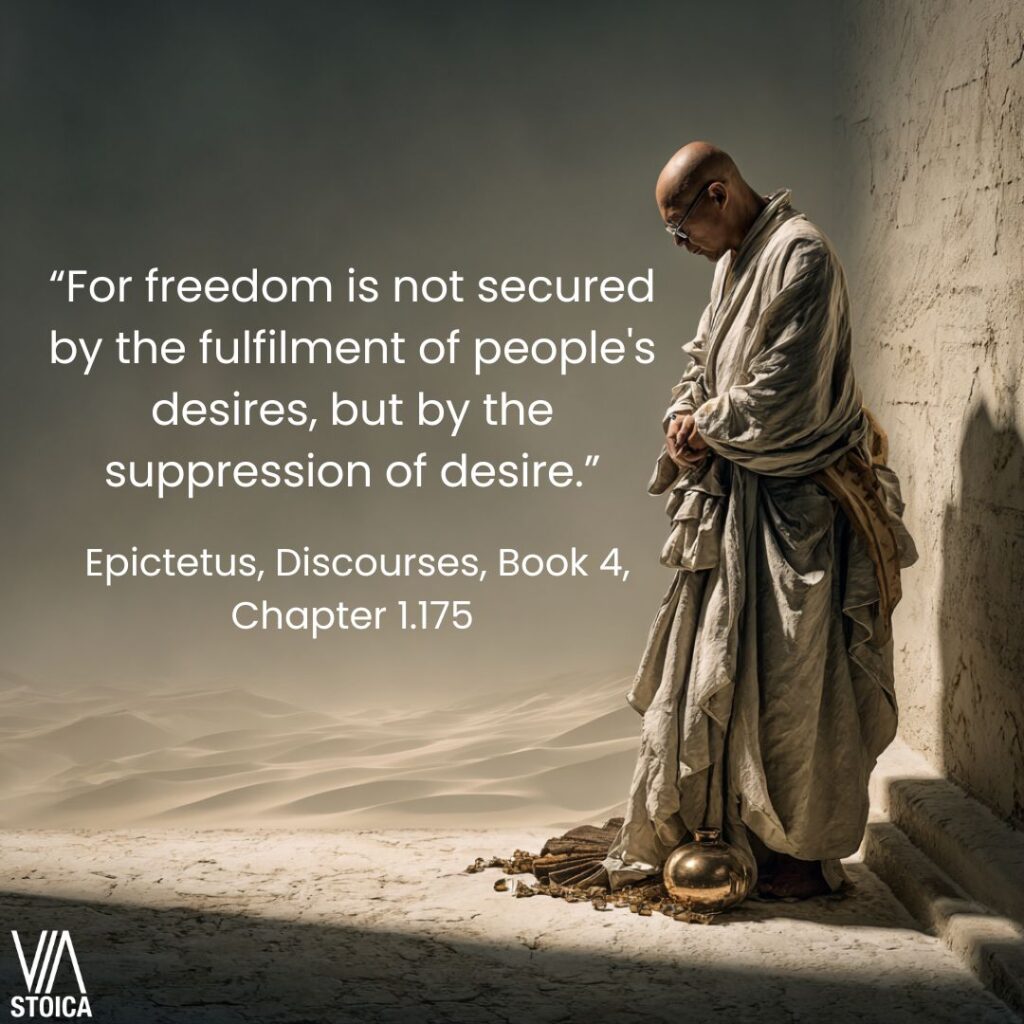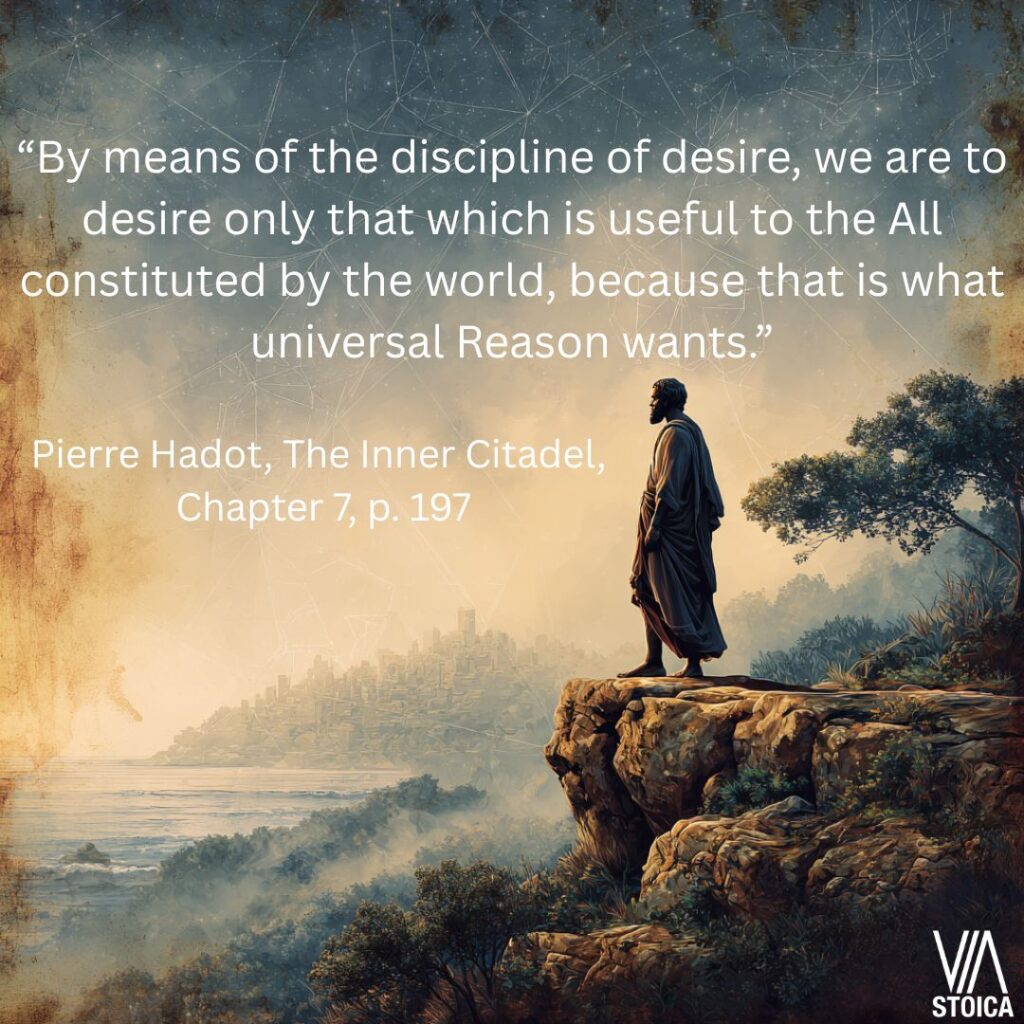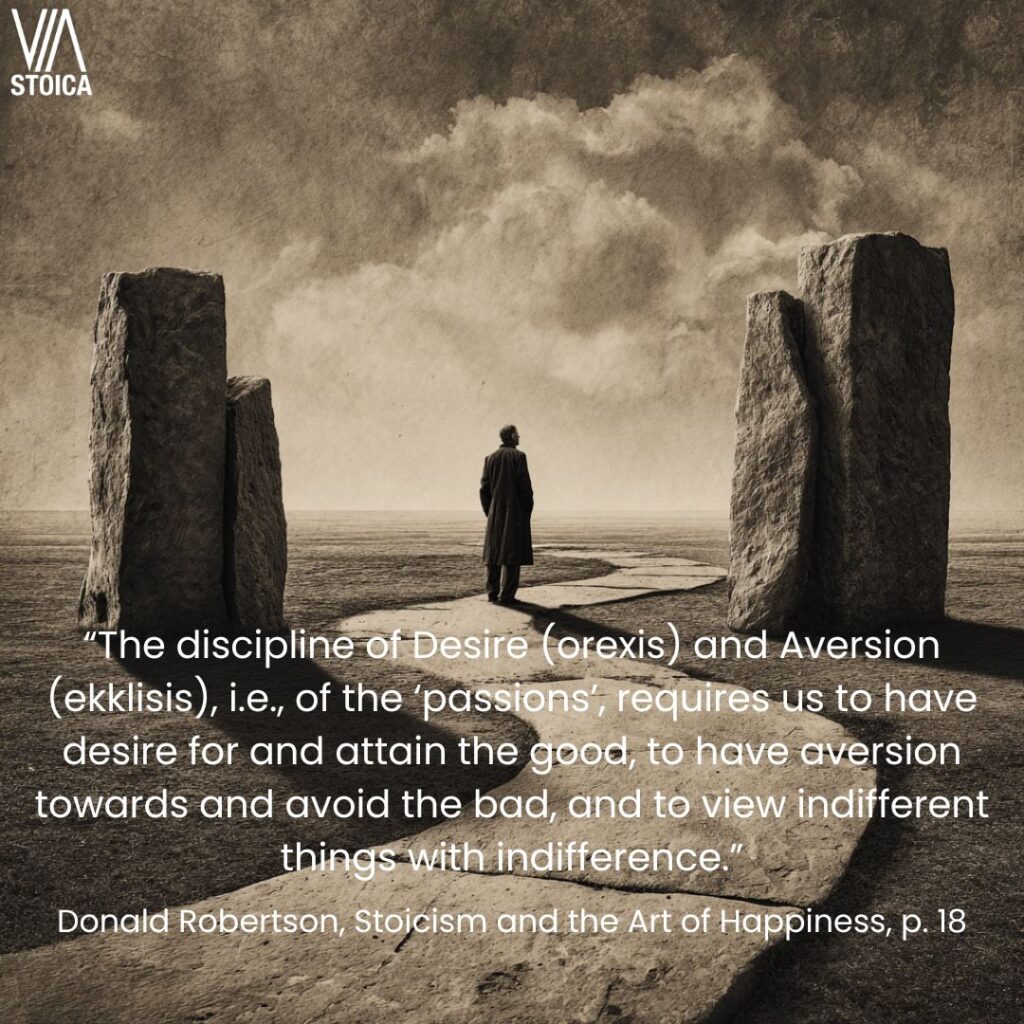What is the Discipline of Desire?

The Discipline of Desire is one of three core Stoic practices, along with the Disciplines of Assent and Action. These three disciplines form the framework through which the Stoic trains perception, emotion, and behavior.
Try the exercises below.
In Stoic philosophy, the Discipline of Desire (Greek: askēsis tou orektikou) refers to the training of our impulses, wishes, and aversions. It teaches us to desire only what is within our control (our own judgments, choices, and actions) and to regard everything else as indifferent (health, wealth, reputation, outcomes).
According to Epictetus, most of our suffering comes from desiring things we do not control. In Stoic ethics, desire (orexis) and aversion (ekklisis) are mirror movements of the soul. We desire what we believe to be good and are averse to what we believe to be bad.
Misjudging desires
The problem is that we often misjudge these things, wanting or avoiding externals as if they determined our happiness. The Discipline of Desire corrects these mistaken judgments by teaching us to desire only what is truly good, virtue, while viewing external events as indifferent, thereby helping us live in harmony with Nature (the Logos) and attain inner freedom.
Struggling with your desires? See if our Stoic coaches can help: Book a Free consultation.
This is not a call to eliminate all desire, but rather to redirect it. Stoicism encourages us to cultivate a strong and focused desire for virtue, the only true good, while remaining indifferent toward everything else. In doing so, we shift from being at the mercy of external outcomes to becoming agents of inner freedom and moral clarity.
Emotional mindset shift
This will change the mindset from a desire for external goods to a wish for virtue, and from an aversion to external bad things to a caution for vice. Reaching a state of Apatheia where we no longer experience the irrational emotions (Pathe), but have the rational good emotions, the Eupatheiai.
“For freedom is not secured by the fulfilment of people’s desires, but by the suppression of desire.”
Epictetus, Discourses, Book 4, Chapter 1.175
Pierre Hadot, in The Inner Citadel, emphasizes that this discipline is not about denying our humanity, but about realigning our nature with the universal order:

“‘My’ nature and the common Nature are not opposed, nor external to each other, for ‘my’ nature and ‘my’ reason are nothing other than an emanation from universal reason and universal nature, which are immanent in all things.”
Pierre Hadot, The Inner Citadel, Chapter 4, p. 125
This tells us that the goal of the discipline is not suppression for its own sake, but integration with the rational Universe. When we desire according to Nature, we no longer resist the universe; we participate in it.
“At this moment, I have what common Nature wants me to have in this moment, and I’m doing what my own nature wants me to be doing at this moment.”
Marcus Aurelius, Meditations, Book 5.25
Natural Impulse vs. Rational Desire
The Stoics made a sharp distinction between our initial impulses (which we share with animals) and the act of assent, which is the rational acceptance, rejection, or withholding of a judgment of an impression.
The moment between impulse and assent is not just a break in reactivity; it is a sacred pause where our desire can be reshaped in alignment with Nature. Instead of blindly chasing what appears attractive or avoiding what appears threatening, we use this space to desire what is good for the Whole, as universal Reason would will.
“By means of the discipline of desire, we are to desire only that which is useful to the All constituted by the world, because that is what universal Reason wants.”
Pierre Hadot, The Inner Citadel, Chapter 7, p. 197
Oikeiōsis — Natural Affinity and Moral Growth
The Stoics taught that all beings begin with a sense of self-preservation, a kind of primitive oikeiōsis (Greek: οἰκείωσις), or “appropriation.”
As we grow in reason, we come to see our true good not in external things but in virtue. Oikeiōsis matures from instinct into moral insight. The Discipline of Desire is a continuation of this natural development: desiring what truly belongs to us, our own character, and nothing more.
Why Beginners Must Suppress Desire Entirely

Epictetus advises that those new to the Stoic path should start by totally suppressing desire. This may sound extreme, but it reflects the idea that early in our training, we are not yet capable of desiring well. Our desires are still shaped by external values (success, pleasure, admiration), and until we unlearn these patterns, we risk being led astray.
“For the present, totally suppress desire: for, if you desire any of the things that are not up to us, you must necessarily be unfortunate; and none of the things which are up to us, and which it would be right to desire, is yet within your reach.”
Epictetus, Handbook, 2
Hadot points out that this initial suppression is a protective measure. In his reading of Marcus Aurelius, he notes:
“Desire and aversion presuppose passivity. They are reactions to appearances that the soul has not examined.”
Pierre Hadot, The Inner Citadel, Chapter 5, p. 114
In other words, to desire rightly, we must first become active participants in our own judgments, rather than passive slaves to emotional reactions. This passivity is what the beginner must guard against.
“Do not give the circumstances the power to arouse anger or grief. Instead, control yourself deliberately, and let your desire direct itself only to what is within your power.”
Marcus Aurelius, Meditations, Book 8.47
Donald Robertson provides a clear and classical definition of this discipline:
“The discipline of Desire (orexis) and Aversion (ekklisis), i.e., of the ‘passions’, requires us to have desire for and attain the good, to have aversion towards and avoid the bad, and to view indifferent things with indifference.”
Donald Robertson, Stoicism and the Art of Happiness, p. 18

This reorientation of desire gives us a reliable compass: want the good (virtue), avoid the bad (vice), and be indifferent to everything else.
Final Reflection
The Discipline of Desire asks us to examine what we want, and why. It teaches us that freedom is not the ability to satisfy every craving, but the power to want only what is truly good. In learning to desire less, we progress to a more peaceful, rational, and good existence.
Practicing the Stoic Discipline of Desire
1. Differentiate Between Internals and Externals
Make it a habit to ask:
- Is this up to me or not?
- Am I desiring something I control (my actions, values)? Or am I craving an outcome (success, approval, results)?
Exercise: Each evening, write down one thing you desired that day and classify it as:
- Internal (aligned with reason/virtue)
- External (beyond your control)
Reflect on whether that desire helped or harmed your peace of mind.
2. Practice the Pause
When you feel a strong desire arise:
- Pause.
- Say to yourself: “This is only an impression. It is not yet the thing itself.”
- Ask: “Is this desire mine, or has it been placed in me by the world?”
This brief moment of reflection allows you to step back from impulsive reactivity and realign your desire with common Nature. It is in this space, between impulse and assent, that rational choice is born.
“When you are struck by the impression of some pleasure, guard yourself, as with impressions generally, against being carried away by it; rather, let the matter await your leisure, and allow yourself a measure of delay.”
Epictetus, Handbook, 34
3. Stay with the Present Task
The discipline of desire is not about endless abstract speculation; it is about how we respond to what is happening right now. Every desire arises in the context of a present impression, a present event, or a present task.
Pierre Hadot explains that each of the Stoic disciplines applies to the moment we are living:
“Marcus Aurelius emphasizes that these exercises are concerned with the present. In the case of the discipline of assent, they are concerned with our present representations. In the discipline of desire, these exercises are directed toward the present event; and in the discipline of active impulse what counts are our present actions.”
Pierre Hadot, The Inner Citadel, Chapter 7, p. 197
When a desire pulls your attention away from the now, bring it back to the present impression. Ask: What is truly needed of me in this moment? This is how desire becomes ethical, not abstract or idealistic, but practical and alive.
FAQ Section
What is the main goal of the Stoic Discipline of Desire?
To align our desires with what is good, virtue, and to move away from wanting external goods such as wealth, fame, or possessions. This also applies to aversions, which should be directed away from vice and toward the cultivation of virtue.
Why does Stoicism advise beginners to suppress desire completely?
Because in the early stages of training, our desires are usually shaped by false values. By temporarily suppressing desire, we create space to retrain our judgments and build a new foundation based on what is truly good, virtue, rather than being misled by externals.
Can I still have ambition and goals as a Stoic?
Yes, Stoicism encourages goals rooted in virtue and reason. You can pursue outcomes like success or health, but your peace of mind should never depend on them. The key is to remain unattached to what lies beyond your control.
Is the Discipline of Desire the same as detachment?
Not exactly. Stoicism is not about withdrawal from life but about engaging with it wisely. The goal is not cold indifference but an appropriate emotional response. Desiring only what is good for one’s character and in harmony with Nature.
How do I know if my desire is virtuous?
Ask yourself whether the desire depends on something within your control, like your intentions, choices, or efforts, and whether it contributes to the development of your character. A virtuous desire is guided by reason and aimed at moral excellence, not external outcomes.
What’s the difference between wanting something and being attached to it?
You can prefer or pursue something, health, success, a relationship, as long as you remain at peace if it doesn’t happen. Stoicism distinguishes between preferred indifferents and attachments. Attachment creates suffering when things don’t go your way; wise preference leaves your freedom intact.
Want to explore more Stoic strategies?
Book a free consultation with one of our Stoic Coaches or read more on How to Practice Stoicism. You can also listen to the Via Stoica podcast on Spotify or Apple Podcasts or watch it on YouTube.



0 Comments